Stay in the know on all smart updates of your favorite topics.
“We’re not just creating technology for cities—we’re creating better cities for people.” From Global Goals to Local Action: How Amsterdam Is Building a Smarter, Fairer City
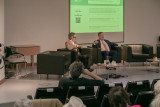
As the world grapples with massive challenges—climate change, rapid urbanisation, digital disruption, and growing inequality—some cities are not waiting for top-down solutions. They are rolling up their sleeves and experimenting with new ways to improve life for everyone, block by block. Amsterdam is one of those cities.
That’s why I was proud to share Amsterdam InChanges approach to smart, inclusive urban innovation at the #CIPPCD2025 conference in Aveiro.
Through our open innovation platform, <strong>Amsterdam InChange</strong>, the city has become a global leader in turning lofty global ambitions into practical, local action. But Amsterdam’s model isn’t built around flashy tech or utopian blueprints. Instead, it’s grounded in an essential question: How can we use innovation to improve people’s everyday lives?
Local Action for Global Challenges
Amsterdam understands that the climate crisis, digital transition, and social inequality can’t be solved by government alone—or by technology alone. That’s why it launched Amsterdam Smart City in 2009 as a public-private partnership. What began as small-scale energy-saving pilots has grown into a community of over 8,500 members, coordinating more than 300 projects across the city and beyond.
The approach is rooted in co-creation. Citizens, companies, knowledge institutions, and government actors come together to design, test, and scale solutions that serve the public good. The values that guide the network are clear: people first, openness, transparency, learning by doing, and public value.
The Doughnut as a Compass
Amsterdam was the first city in the world to embrace Doughnut Economics as a guiding framework. The “City Doughnut,” developed with economist Kate Raworth, helps policymakers balance the city’s ecological footprint with the social foundations that all citizens need: housing, education, health, equity, and more. It’s a tool to align every local decision with both planetary boundaries and human dignity.
This framework has inspired circular construction strategies, neighbourhood energy co-ops, and more inclusive procurement policies. It shows that global concepts can become real when grounded in local practice.
Making Innovation Inclusive
One of Amsterdam’s core beliefs is that smart cities must be <strong>inclusive cities</strong>. That means tackling issues like <strong>mobility poverty</strong>, where rising transport costs and digital-only services make it harder for low-income or elderly residents to get around.
Through the <strong>Mobility Poverty Challenge</strong>, Amsterdam partnered with the Province of North Holland and researchers from DRIFT to understand where and how exclusion occurs—and to design better public mobility systems. Pilot ideas like a “Mobility Wallet” (a subsidy for essential travel) and more inclusive digital apps emerged from real conversations with affected residents.
The same inclusive mindset guides Amsterdam’s digital transformation. In the suburb of Haarlemmermeer, officials flipped the script on e-government. Instead of asking citizens to become “digitally skilled,” they asked how government systems could become more <strong>humane</strong>. This led to simplified interfaces, better access to services, and ultimately more trust.
Responsible Tech and Energy from the Ground Up
Tech transparency is another pillar of the Amsterdam model. The city runs the world’s first <strong>Algorithm Register</strong>, giving the public insight into how AI and automated systems are used in services—from traffic enforcement to housing applications. Anyone can access this register, offer feedback, and better understand how digital decisions are made.
In the energy space, the city supports both bold innovation and careful upscaling. At the <strong>Johan Cruijff ArenA</strong>, used electric vehicle batteries store solar energy, powering concerts and matches with clean backup power. At the same time, a coalition of partners led by Amsterdam InChange is working to scale up Local Energy Systems by collecting lessons learned and creating a toolkit for community-led energy.
What Makes It Work?
If there’s one secret to Amsterdam’s success, it’s the governance model: small, neutral facilitation teams guiding large multi-stakeholder coalitions, anchored by public trust and shared purpose. Regular Demo Days allow project teams to showcase progress, get feedback, and adapt. This culture of transparency and iteration helps avoid the so-called “innovation graveyard,” where pilot projects go to die.
The city also embraces failure—as long as it’s shared and learned from. Reports like “Organising Smart City Projects” openly list lessons, from the importance of strong leadership to the need for viable business models and continuous user involvement.
An Invitation to Other Cities
Amsterdam’s smart city is not a blueprint—it’s a mindset. Start with your biggest local challenge. Bring the right people together. Make space for experimentation. Build bridges between local and global. And, above all, put citizens at the centre.
As international smart city ambassador Frans-Anton Vermast puts it: “We’re not just creating technology for cities—we’re creating better cities for people.”
The III International Conference on Public Policies and Data Science
Data Dilemma's verslag: De Voedseltransitie
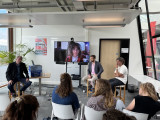
Op 30 mei nodigden we onze community uit bij AMS Institute op het Marineterrein voor een Data Dilemma’s event over de Voedseltransitie. Het ging deze middag over technische dilemma’s rond data en de verduurzaming van voedselketens, en; wat is nou echt lokaal voedsel?
Data Commons: Een digitaal gemeenschapsgoed met een gezamenlijk doel
Jan Wester, directeur van Big Data Value Center, vertelde ons meer over het project ‘Data Value Center Agri & Food Korte Keten’. Aanleiding voor dit project is de transitie naar een duurzamer voedselsysteem waarbij digitalisering en data een belangrijke rol spelen. Er is de wens dat relatief meer voeding uit de regio komt (in plaats van langere ketens), dat er meer transparantie en efficiëntie is in ketensamenwerking en dat er meer informatie wordt vastgelegd over productie en herkomst (denk aan True Pricing). Dit vraagt om een neutraal precompetitief platform. Dit platform kan je zien als een zogenaamde Data Commons: een digitaal gemeenschapsgoed waarin je samen afspraken maakt over het delen van data; wat deel je, met wie, en wat is het gezamenlijke doel ermee?
De Agrifood Data Common is een veilige data-deel omgeving/marktplaats/dashboard, met verschillende gebruikersgroepen. Ondernemers kunnen hiermee bijvoorbeeld markten transparanter maken, ketensamenwerking verbeteren en meervoudige verdienmodellen creëren. Overheden kunnen gebruik maken van de omgeving voor meer evidence-based beleid en het monitoren van impact. Ten slotte kunnen kennisinstellingen gebruik maken van het platform voor de opbouw van referentiedata en het delen van data uit experimenten en fieldlabs. Belangrijk is dat de verschillende partijen vertrouwen met- en in elkaar opbouwen om dit samen te laten werken.
De cateringketen van de Hogeschool van Amsterdam als case
DVC Agri & Food is samen met partners cases aan het bouwen die het nut en belang van dit digitale gemeenschapsgoed in de praktijk tonen. Kees Willem Rademakers van de Hogeschool van Amsterdam vertelde ons meer over het ‘Food Governance 2.0’ project met betrekking op hun eigen cateringketen.
De HvA wilt zich actiever afvragen wat ze van (hun) voedsel vinden en hoe ze een nieuwe rol kunnen spelen in hun eigen lokale voedselsysteem. Ze kijken naar factoren als gezondheid, biodiversiteit, betaalbaarheid en energiegebruik. Als je hier kritisch naar wilt kijken blijkt hoe moeilijk het is om te onderzoeken waar kantineproducten precies vandaan komen. De precieze oorsprong, de reizen die het afgelegd heeft, de arbeidsomstandigheden; het zijn onderdelen waar je als afnemer grip op- of in ieder geval een beeld van wilt hebben. Er is nu een ongelijke machtsverdeling waarbij de leverancier meer data over de keten bezit en dit gebruikt als verdienmodel.
Binnen een keten die digitaal en transparant is georganiseerd, kan de HvA zien wat er nu gebeurt, kan er onderhandeld worden, en kunnen ze samen gaan hervormen waar ze naartoe willen. Het is belangrijk om daarom de governance structuren over voedselketens en de informatiestructuren daarbinnen opnieuw vorm te geven met elkaar. Jan Wester en Kees Willem Rademakers concluderen samen dat deze hervorming vooral zit in wederkerigheid en bereidheid om meer data met elkaar te delen, en de digitale platformen die dit mogelijk maken.
Flevo Campus: Samen werken aan het stedelijk voedselsysteem van de toekomst
Lenno Munnikes vertelde ons meer over lopende initiatieven bij de Flevo Campus. Een organisatie waar onderzoek, onderwijs, ondernemerschap en overheden samenkomen om samen te werken aan het stedelijke voedselsysteem van de toekomst. Hier verbinden ze economische, maatschappelijke en kennis-vraagstukken op het gebied van een duurzame voedseleconomie en een gezonde voedselomgeving.
In een project rond ‘de supermarkt van de toekomst’ zijn ze aan het experimenteren met het verbreden van het assortiment van lokale producten in de schappen. Als je een deel van een supermarkt bijvoorbeeld reserveert voor lokale ondernemers, ontstaat er al sneller een match tussen lokale consumenten en lokale producenten. Ook wordt er gekeken hoe je stadstuinderijen kan ontwikkelen met een mix van verschillende functies. Naast voedselzekerheid, kan zo’n plek ook een belangrijke educatiefunctie vervullen voor kinderen en jongeren in de buurt, kan er onderzoek plaatsvinden, kunnen er nieuwe verdienmodellen worden uitgeprobeerd, en kan de tuin gekoppeld worden aan een zorgcentrum in de buurt.
Ten slotte vertelde Lenno over hun projecten in de zogenaamde Labs. Hier experimenteren ze op kleine schaal om ons aan het denken te zetten over ons voedselsysteem. Een bekend voorbeeld is het hergebruiken van de ‘reststromen’ van de kip. Na slachting wordt zo’n 70% van het dier als reststroom verscheept naar andere continenten. Maar wat als je nou alles van de kip verwerkt? Hoe kan je omgaan met onderdelen van een dier dat je niet opeet? Met deze vragen gingen ze aan de slag en creëerden ze bijvoorbeeld een tasje van de huid, zeep van het vet en keramiek van de botten. Een experiment als dit kan op kleine schaal worden uitgevoerd, maar via nieuwskanalen veel mensen bereiken en aan het denken zetten over ons voedselsysteem.
Onderzoek naar de klimaatimpact van een voedselketen; van verantwoording naar nieuwsgierigheid
Leen Felix, adviseur Agrifood en Biodiversiteit bij Metabolic, nam ons mee in het proces waarmee ze bedrijven adviseert over de duurzaamheid van hun voedselketen. Het begint simpel, bij de ingrediëntenlijst van een product. In plaats van de locatie van de leverancier, moet je echt op zoek naar de productielocatie; het land van herkomst per ingrediënt. De impact van voedselproductie hangt namelijk af van de combinatie van het productieproces en de productielocatie. Maten van landgebruik, bodemtransformatie en uitstoot van broeikasgassen, bijvoorbeeld, hebben ieder een effect op de natuurlijke omgeving. De ruimtelijke context bepaald hoe schadelijk deze processen zijn voor de aarde en het klimaat. Je kan hierbij denken aan de volgende voorbeelden: Het verbouwen van soja, waarbij veel land voor nodig is, is schadelijker als er regenwoud in Brazilië voor wordt gekapt. Het transformeren en homogeniseren van de bodem is schadelijker voor het klimaat, als dit gebeurt op een plek waar voorheen een relatief hoge mate van biodiversiteit aanwezig is. Water-intensieve productieprocessen hebben meer impact op mens en natuur als het plaatsvind op locaties waar water schaars is.
Metabolic koppelt daarom ruimtelijke context aan productieprocessen. Via scores is te zien hoe de negatieve impact van productieprocessen nog sterker is in ‘gebieden met een gevoeligheid’. Dit legt de complexiteit vast waar je in mondiaal voedselsysteem mee te maken hebt. Hoe meer ingrediënten in een product, hoe meer productielocaties, hoe meer factoren die de klimaatimpact beïnvloeden. Het is voor Leen als analist en adviseur de balans zoeken tussen het weergeven van álle data en de complexiteit van de keten, en het adviseren met een platgeslagen verhaal waar de opdrachtgever soms naar op zoek is. Je wilt een bedrijf niet verlammen met de data, maar ze ook wel gericht handvatten geven om bijvoorbeeld risicolocaties en ingrediënten te vermijden.
Leen sluit af met een drietal lessen voor het publiek:
- Perfecte data bestaat niet, en dat is niet eens zo erg: focus op het verhaal wat je ermee kan en wilt overbrengen.
- Van verantwoording naar nieuwsgierigheid: Je kan dus niet 100% verantwoorden en berekenen, maar je moet wel een nieuwsgierige houding tonen over bijvoorbeeld alle bijkomende milieulasten en context risico’s.
- Geen top 10 maar systeemdenken: Duurzaamheid als een simpel thema laten vallen, het is geen top 10 maar denk in systeem met contrasten, schaal, complexiteit, ruilfuncties. ‘One size fits all’ oplossingen werken niet.
Dank aan de sprekers voor hun verhalen en het publiek voor de levendige discussies na afloop. Wil je bij onze volgende Data Dilemma's zijn? De volgende editie van deze serie open events vindt plaats op 16 juli. Ook staan we altijd open voor nieuwe thema’s en onderwerpen voor deze serie; we zijn benieuwd wat voor data dilemma’s jij mee in aanraking komt bij je werk!
Amsterdamse ziekenhuizen gaan data delen
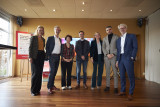
Amsterdam UMC, OLVG en het Antoni van Leeuwenhoek (AVL) gaan elkaars medische data gepseudonimiseerd hergebruiken in Health Data Space Amsterdam.
HDSA is een geheel nieuwe, regionale zorgdata-infrastructuur. Deze ondersteunt patiëntenzorg en medisch wetenschappelijk onderzoek naar gezondheid en preventie. Met als doel: gezondheidsverschillen in de regio te verkleinen en de gezondheidszorg toegankelijk te houden.
Het initiatief van de drie Amsterdamse ziekenhuizen komt voort uit een bredere samenwerking met de Universiteit van Amsterdam, Vrije Universiteit Amsterdam, Gemeente Amsterdam, Amsterdam Economic Board en Philips. Verder trekken de ziekenhuizen nauw op met Amsterdam AI, het Amsterdamse samenwerkingsverband voor kunstmatige intelligentie, en Health-RI, dat zich inzet voor een landelijke geïntegreerde gezondheidsdata-infrastructuur voor onderzoek, beleid en innovatie.
HDSA faciliteert met deze betere en snellere uitwisseling van zorgdata wetenschappelijk onderzoek naar gezondheid, beter medisch inzicht in hoe mensen langdurig gezond kunnen blijven, gepersonaliseerde preventie en behandeling van ziekten. De samenwerking is een eerste stap in de aansluiting op (een nog te bouwen) nationale infrastructuur vanuit het Integraal Zorgakkoord (IZA) en een Europese samenwerking via het European Health Data Space (EHDS).
Lees het complete bericht via
Minecraft Almere Pampus Challenge: pushing the boundaries to build the city of the future

In today's dynamic landscape, the key to success lies in collaboration. The Green Innovation Hub firmly believe in the power of partnerships between companies, government and educational institutions to drive innovation, growth and positive change. In a world where technology connects us in unique ways, the Minecraft Almere Pampus Challenge exemplified the power of communities coming together to achieve remarkable feats.
It's inspiring to witness the incredible work of our young talents. They are the architects of the future and they're currently building virtual cities where companies can find their next digital solutions. Whether you represent a company, government department, or educational institution, we invite you to connect and explore how we can collaborate to make a meaningful impact on our shared goals.
1. Fresh Perspectives: young talent brings fresh and innovative perspectives to the table. They're unafraid to challenge the status quo and reimagine how things can be done.
2. Cutting-Edge Tech: these virtual cities are powered by the latest technologies from Microsoft and Iamprogrez. Companies can tap into this tech-savvy generation to incorporate cutting-edge solutions into their operations.
3. Collaboration Opportunities: collaborating with these digital pioneers can lead to mutually beneficial partnerships. Your company can gain a competitive edge while offering mentorship and growth opportunities to the next generation.
Find the Green Innovation Hub (NL Pavilion) at the Smart City Expo World Congres in Barcelona, and let's meet each other. Together, we'll keep pushing the boundaries of what's possible in the Minecraft universe and to build the house – or even the city of the future. Also stay tuned for upcoming advantures, events and challenges on our channels.
Watch the video: https://youtu.be/4F7CFGfb2HE
Vote your favourite innovative idea to the AmSIA stage!
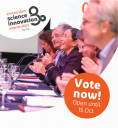
Which innovative idea will make it to the stage during the finale of the Amsterdam Science & Innovation Award 2023? This Innovation Award is the Amsterdam competition for research based innovative ideas that contribute to a better world. Check out the website and watch the pre-finalists one-minute videos in which they present their innovative ideas and vote for your favorite! During the finale on 21 November, the jury will award € 10,000 to the three best ideas in the categories of Society, Health and Environment & Climate.
Exploring the Future of Data in the Circular Economy: Highlights from Data Dilemma’s!
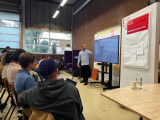
Amsterdam, a city with an ambitious goal of becoming fully circular by 2050, envisions a future where materials are continuously reused, waste is minimized, and resource cycles are closed. Achieving this vision hinges on the availability and analysis of data, which allows us to assess the extent to which materials are used, reused, or wasted. However, this data is often elusive, complex to analyse, and, in some cases, not even recorded. These challenges surrounding circular data were the focal point of our recent event, "Data Dilemma's: Collecting Data for the Circular Economy."
During Data Dilemma's, we explore the possibilities for using data and new technologies to address urban and societal challenges, with a focus on responsible digitalization. The goal is to use data to make cities more safe, clean and accessible. But what happens to all the data that is collected? Which dilemmas do we encounter when we collect (personal) data to improve the city.
Apparently, the topic of this edition of Data Dilemma’s was not only of interest to the Amsterdam Smart City team, since this event was completely sold out. This was no surprise, with the three incredible speakers we had lined up: Mersiha Tepic (municipality of Amsterdam), Maarten Sukel (Picnic), and Joris Bouwens (Metabolic).
Mersiha Tepic: Circular Economy Monitor Amsterdam
Mersiha Tepic, Senior Researcher at the Research & Statistics department of the Municipality of Amsterdam, demonstrated the Circular Economy Monitor Amsterdam. This essential tool tracks Amsterdam's progress towards a circular economy and identifies areas requiring further attention.
The monitor gives interesting insights. For instance, it shows that the environmental impact of food is four times as big as the impact of the built environment, even though the amount of materials used in the built environment is four and a half times larger than for food.
It reveals that food has a very high environmental per kilogram compared to materials from the built environment. This is interesting because it makes the total environmental impact of food much higher than the impact of the built environment, even though the built environment uses four times as much mass in materials than food.
For more information on the circular monitor and all its insights, you can check out their (Dutch) website.
During her presentation, Mersiha also delved into the data dilemma she faces in this project—the scarcity of data from significant commercial entities operating within the city. The lack of data from these key players poses a considerable challenge to Amsterdam's circular ambitions, and Mersiha's work sheds light on the importance of bridging these data gaps.
Maarten Sukel: Data-Driven Precision at Picnic
Our second speaker, Maarten Sukel, a Data Scientist at Picnic Technologies, showcased how the online supermarket Picnic leverages data. He presented an innovative approach that combines traditional data sources with images, written descriptions, and geographical information to predict customer preferences accurately. By doing so, Picnic not only optimizes its supply chain but also minimizes waste, aligning with the circular economy's core principles.
Maarten's insights provided a glimpse into how data-driven precision can be a game-changer in the pursuit of sustainability and waste reduction, and he also gave a convincing sales pitch on why you should be a customer of Picnic.
Joris Bouwens: The Promise of Digital Product Passports
Closing the event was Joris Bouwens, a Project Manager and Senior Consultant at Metabolic's Circular Industries team. Joris shed light on Digital Product Passports and their potential to revolutionize the circular economy. These passports offer a comprehensive digital record of a product's lifecycle and environmental impact, empowering consumers to make informed choices and encouraging responsible consumption and recycling.
Joris's presentation highlighted the immense opportunity presented by Digital Product Passports in getting as much value from used products as possible. To fully illustrate the potential of Digital Product Passport, Metabolic has created a visualization of the data flows in four sectors: Electronics, Chemicals, Apparel, and Construction. You can find these visualizations here.
We extend our gratitude to our amazing speakers for their invaluable contributions and to our engaged audience for their active participation in the discussion.
In the next edition of Data Dilemma’s we will delve into the fascinating world of the underground. What cables, tubes, and other assets can be found there, how is the data on these assets shared, and how can we improve collaboration? We hope to see you there on the 26th of October.
Do you have any suggestions for which Data Dillema's we should uncover next? Let us know in the comments below.
New research on Smart Building Maintenance

Interested in hearing more about Smart Building Maintenance? Feel welcome to join the public defense of the PhD thesis “Crafting Intrapreneurial Stewardship – An institutional perspective on client-led innovation in smart building maintenance“ by Koos Johannes, PhD student in the department of Construction Management. The defense will take place on the 16th of January at 10:30 AM at the Waaier building at the campus of the University of Twente.
About the the PhD thesis
Available research suggests that construction clients, as building owner-occupier, are struggling to implement smart maintenance. This thesis assumes that these reported problems are due to a failure to fully understand the institutional complexities of smart maintenance commissioning in organizational networks. Hence, the aim of this thesis was to improve our understanding of these complexities and to develop theoretical and practical knowledge on the professionalization of construction clients in commissioning smart maintenance through stewardship. Stewardship theory portrays managers and employees as collectivists, pro-organizational and trustworthy, and can be used for designing collaborations based on intrinsic motivation and trust.
The defense will take place on the 16th of January at 10.30 AM at the Waaier building at the campus of the University of Twente.
A summary of the thesis can be read here.
If you want to receive a copy of the thesis, please send a message to: k.johannes@hva.nl
The presentation and defense will be in English; a Dutch summary is available.
Address: Hallenweg 25, 7522 NH, Enschede (see map for parking on the Campus; with public transport the Campus can be reached from train stations Hengelo or Enschede).
Are smart cities the key to sustainable, thriving cities of the future?
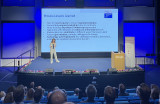
That was the main question we talked about September 14 at the FuW Forum in Zurich. Sharing learnings and exchanging ideas and experiences is of great value. To learn from each other, align and get inspired. That is why Amsterdam Smart City hosts a lot of international groups in our Smart City Lab and sometimes visits interesting international conferences to share our story.
The FuW Forum in Zurich had a very interesting line-up with speakers from all over the world. It was an honour for me to give an inspirational key note on behalf of Amsterdam Smart City. The message I wanted to get across: "Don't overestimate technology. Smart technology offers great opportunities but to make it work we have to make a whole ecosystem work. And that means cooperate, listen to each other, help each other, fail, learn, adapt, try different perspectives.....All so called 'soft' skills that we need to combine with a world of bits and bytes. That is where the real challenge lies. To overcome these issues a world in transition needs an independent and neutral place, where changemakers can meet interact and start working together.” An exciting message to bring being at Google headquarters. But I was glad to hear that most speakers and participants saw smart technology as a means to an end instead of a goal in itself.
Below some interesting quotes of other speakers:
Prem Ramaswami – Google
"We invented the technology of cars to move from A to B and now we spend most of the time standing still in the traffic – 42% of the cities are parking lots."
Ute Schneider - Technical University Wien
"We only start moving, when it really hurts"
Silke C. - Fraunhofer Gesellschaft
“At the moment, data is not fully exploited, the data is distributed everywhere and cannot be brought together, there is a lack of trust – that is why a European governance is now being built."
Salomé Mall - Smart City Lab Basel
"The real estate industry is not mobile, it needs innovation to bridge the next crisis."
Markus Schläpfer - ETH Zurich
"If we measure and understand human flows, we can use this for transport, infrastructure and the use of modern technologies.”
And Audrey Tang, Taiwan's Digital Minister
"With the first Ministry of Digital Affairs we encourage the digital collaborative democracy between government and people - we must trust each other going into future live.”
Bio-based renovation
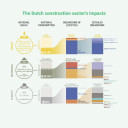
The primary reason to renovate buildings is to improve indoor climate quality and reduce environmental impact. This can be extremely effective, as 75% of buildings' CO2 emissions are released during the use phase. However, using non-renewable materials during renovation can be entirely counter-productive.
Check out this article to learn about bio-based materials in the renovation, and the obstacles to bio-based innovation.
Recap of Demo Days #16 – Circular meets Digital
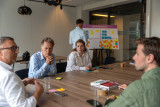
For the sixteenth edition of our Demo Days, we were finally able to meet offline again since the start of the pandemic. This meant: old-school post-its instead of filling online Miro boards. The Circular & Digital Demo Day was hosted at one of our partners’ locations, the Digital Society School at the Amsterdam University of Applied Sciences. From reducing illegal drones in the city to reusing materials through a digital material database, in this article you’ll read all about circular & digital projects our partners are working on.
About our Demo Days
The Demo Days are one of the tools we use to stimulate innovation and encourage connection between our partners and community. The purpose of the Demo Days is to present the progress of various innovation projects, ask for help, share dilemmas and involve more partners to take these projects to the next level. More information about the Demo Days can be found here.
Demo Day: Circular & Digital
Reducing (illegal) drones in the city - Daan Groenink (municipality of Amsterdam)
In Amsterdam, and in many other places in the Netherlands, is not allowed to fly drones. But despite the regulations, many drones are still flown illegally over Amsterdam. Daan Groenink from the municipality of Amsterdam invited the participants to reflect on how the city of Amsterdam can reduce (illegal) drone usage with as little enforcement as possible. Many creative interventions were discussed, such as awareness campaigns, making beautiful drone images public, and renting out drones as an experience.
Subsidy scheme for circular chain cooperation - Suzanne van den Noort en Maartje Molenaar (province of Noord-Holland)
The province of North Holland wants to be 100% circular by 2050. To achieve this, an action agenda has been drawn up for 2021-2025 with strategic and operational goals. The province of North Holland initiated the ‘Circular Economy Subsidy Scheme’ to accelerate the circular transition. The province of North Holland already thought about how this subsidy scheme should work. In this session, the participants gave their feedback. One of the key take outs from the working session was: keep it simple. You want to know that the money is well spent and therefore the conditions of the subsidy scheme should be clear.
Digital material database – Mark van der Putten (municipality of Amsterdam)
The City of Amsterdam is developing a digital material database for the necessary exchange of information to enable the reuse of materials from projects. Projects can use this database to report their available materials or to reserve materials. In this way, a street can be paved with tiles from an old project. The municipality of Amsterdam asked for input from the Amsterdam Smart City network on what to keep in mind while developing a digital material database. During the session, the participants discussed topics such as data governance, data ownership and the advantages of a SAAS solution compared to a self-built database. The municipality of Amsterdam will continue to research how the material database could be used and what the stakeholders think of it during 6 pilot projects.
Want to join the next Demo Day?
Are you working on an innovative project that could use some input? Or are you preparing for an inspiring event that needs a spotlight? Our next Demo Day takes place on the 11th of October. If it fits within our themes (circular, mobility, energy and digital), sent a message to Sophie via sophie@amsterdamsmartcity.com or let us know in the comments. We are happy to talk with you to find out if it's a match!
Would you like to participate in the next Demo Day and share your thoughts on our partners’ innovative projects? As soon as the program for the next Demo Day is determined, we will share it on the platform and give you the opportunity to join as participant.
Curious to mobility & energy projects? Read more about it in the recap of Demo Day Mobility & Energy.
Photo: Myrthe Polman
Building with recycled building materials
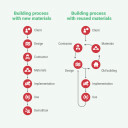
Reused materials are an important element of circular construction. The more re-used components and recycled materials we use, the fewer virgin materials we need, and the lower our environmental impact. To do so effectively, the supply of reused components and recycled materials should influence the building’s design.
Learn more in the article below.
Industrial Symbiosis
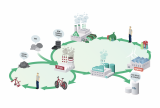
At the end of its production process, waste or “output” produced by one company can be reborn into a valuable raw material or “input” for another.
This process is called “Industrial symbiosis”.
Learn more about it in the link below.
Onderzoeksrapport Facility Sharing in de MRA: Optimale benutting van (kennis) faciliteiten in de regio
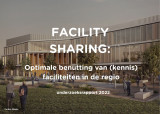
Campussen en kennishubs in de metropoolregio Amsterdam zijn rijk aan onderzoeksfaciliteiten, kennis, testruimtes en geavanceerde apparatuur. Uit de gesprekken met de gemeente Amsterdam en diverse campussen zoals het Amsterdam Science Park en het Amsterdam Life Sciences District komt de aanname naar voren dat veel aanwezige faciliteiten maar voor een klein deel benut worden. Dit terwijl faciliteiten vaak een flinke investering zijn geweest voor bedrijven en kennisinstellingen. Wij zien hier een grote kans voor de MRA. Optimale benutting van faciliteiten kan onnodige investeringen voorkomen, ruimte en grondstoffen besparen en mensen uit verschillende hoeken bij elkaar brengen.
Onder de noemer ‘Project Facility Sharing in de MRA’ hebben wij deze kans verkend. Deze verkenning bestaat uit afgenomen interviews en georganiseerde bijeenkomsten. Deze verkenning is uitgewerkt in het rapport: “Facility sharing: optimale benutting van (kennis) faciliteiten in de regio”
Voor meer informatie kun je mailen naar hello@campus.amsterdam
ampus Amsterdam is het netwerk dat alle innovatiegebieden, campussen en kennislabs in de metropoolregio aan elkaar verbindt waardoor de kenniseconomie van de regio wordt versterkt.
RESILIO and its business case.

It’s all about the money: A Smart RESILIO Blue-Green Roof might sound a little pricey. But is money all what counts? Are these roofs affordable? In this third part of the RESILIO blue-green roofs movie sequence we explain to you the overall value and benefits for the society and how to approach these in a financial matter. Maybe we have to broaden our view on how we assign value to an object and use these outcomes as a solution for financing. Daniel van den Buuse, PhD and Hans de Moel tell us all.
The smart technique between blue-green roofs.

Today we will launch our brand new five-part movie series of RESILIO!
This serie will dive into the different approaches & researches within the project and the partners with their specific expertises. In the first one Kasper Spaan from water company Waternet and Friso Klapwijk MetroPolder Company explain you how smart micro watermanagement can be of paramount importance to a complete city. It’s not just a drop in the ocean... check it out here:
Shaping development in cities to combat climate change
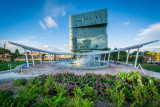
Ever wondered what life would look like in a sustainable, regenerative city?
With cities occupying only 3% of the global land surface but contributing to 70% of emissions, positive change can have a big impact. Metabolic CEO Eva Gladek reflected on how we can all become city makers. In light of COP26, it might be time to refocus on our cities.
Ready to take action? Find out how in the link below.
City of Amsterdam focuses on sustainability and circularity for the seventh edition of its Startup in Residence innovation programme.

The City of Amsterdam is on the lookout for innovators for the seventh edition of its Startup in Residence programme. This year’s programme will focus on the themes of sustainability and circularity, with the city looking for its best entrepreneurs, start-ups, scale-ups and SMEs to develop creative and innovative solutions.
On the journey to a circular economy, don’t forget your materials passport

If we can find a way to reuse building materials for new construction effectively, the energy, labor, and transportation costs of producing new materials can be saved, and so can the associated emissions.
Check out this article by Metabolic, where they dive into a promising potential solution: materials passports.
Building back better with a systemic approach

As the world grapples with vaccinations, variants, and how to return to "normal", it’s a good time to reflect on whether or not we are fully equipped to prevent future shocks.
Building true resilience means addressing the systemic issues that make our world increasingly fragile, by understanding the deeper structures and mental models at the root of a problem to create lasting solutions.
Check out our article done by Metabolic last year about building back better.
14 questions to guide entrepreneurs towards deep and lasting impact

To achieve a circular economy, innovation is key. One of the key ways to get here is through entrepreneurship. To be effective in this journey, entrepreneurs need to know how to navigate what creating a deep, transformational impact really means.
• How do we decide where to focus our attention?
• How do we design solutions and organizations that provide the best chances for success?
14 questions to maximize impact
Chis Monaghan, Co-Founder at Fresh Ventures Studio, a Metabolic spinoff, developed these 14 questions to serve as a simple checklist for anyone looking to maximize the impact of a particular initiative. Fresh Ventures is a venture-building program and startup studio based in The Netherlands.
Stay up to date
Get notified about new updates, opportunities or events that match your interests.

